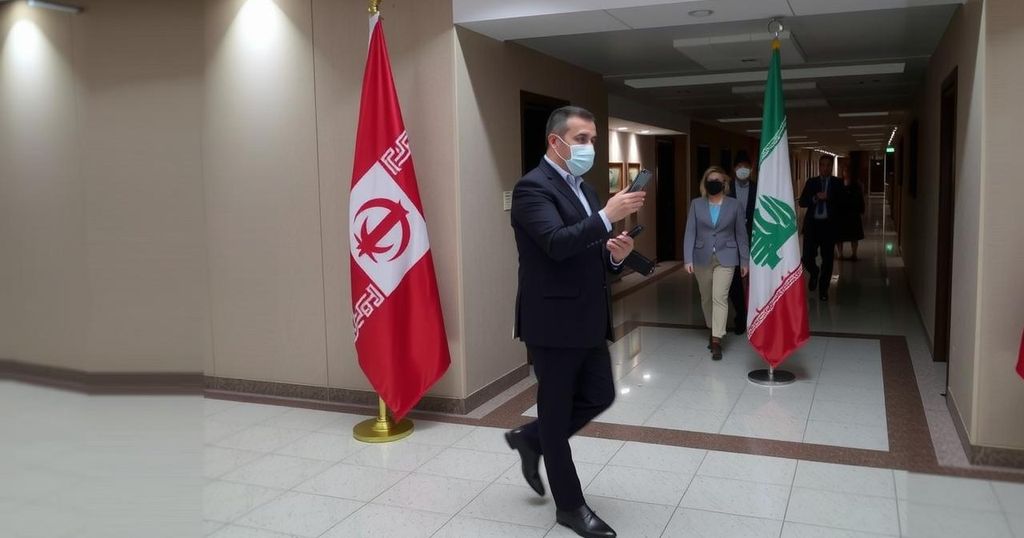Lebanon’s Foreign Ministry confirmed that funds held by an Iranian diplomat at Beirut Airport were intended for embassy expenses. The incident arose from the diplomat’s refusal to permit a baggage search, leading to tensions at the airport, including a mobilization of Hezbollah-affiliated youths. This event occurs against a backdrop of scrutiny over Iranian financial support to Hezbollah and Lebanon’s response to Iranian influences.
Lebanon’s Foreign Ministry confirmed that funds carried by an Iranian diplomat at Beirut Airport were designated for embassy expenditures, following an incident where the diplomat resisted a security search. On January 3, the Ministry revealed it had authorized the diplomat’s baggage entry based on a formal communication from the Iranian Embassy, in alignment with the Vienna Convention on Diplomatic Relations.
The Iranian Embassy in Beirut clarified that the diplomat’s luggage contained vital documents and cash necessary for the embassy’s operational expenses. Iranian media reported that violent confrontations arose between security officials and Iranian diplomats during attempts to inspect their baggage, leading to Hezbollah-affiliated youth mobilizing towards the airport, prompting the Lebanese Army to secure the area with roadblocks.
This occurrence marks the third similar incident since November and occurs amidst mounting tensions surrounding Iran’s influence over Hezbollah, particularly in the context of its diminishing political power in Lebanon. The Lebanese government’s dedication to preventing Iranian financing and weapon supply to Hezbollah has been called into question, leaving observers uncertain if these security actions are meant to appease American and Israeli concerns about Iran’s connections.
In a related event, Lebanese security previously inspected an Iranian flight and its passengers, reinforcing their stance that any cash discovered during these inspections would be confiscated. Reports suggest that Iran has been attempting to move significant monetary amounts to Hezbollah via Mahan Air flights, heightening scrutiny from Lebanese authorities.
Hezbollah Deputy Secretary-General, Naim Qassem, revealed in December that Iranian-funded assistance totaling $50 million was distributed to over 233,000 registered displaced Lebanese families, with claims that total aid could reach $77 million, depending on the population receiving assistance. He emphasized that affected Lebanese families received considerable support for their losses, further highlighting Iran’s ongoing financial role in Hezbollah’s operations.
The historical context of Iranian financial support to proxy groups has been documented; for instance, Mahmoud al-Zahar of Hamas acknowledged on Al-Alam TV receiving $22 million during a trip to Tehran in 2006 from Qassem Soleimani. Moreover, significant allocations have been reported, such as the $651,000 directed to Palestinian families in Gaza around ‘Quds Day’ in 2019. Such instances illuminate the intricate web of financial aid facilitated by Iran across the region.
The incident at Beirut Airport involving an Iranian diplomat has brought to light ongoing tensions regarding Iran’s influence in Lebanon and its support for Hezbollah. Following several prior instances of similar diplomatic confrontations, the Lebanese government’s actions raise questions about its commitment to curbing Iranian influence. This complexity is compounded by the backdrop of deteriorating relations within the region and Hezbollah’s struggle against Israel, further accentuated by Iran’s financial dealings with various groups concurrently.
In summary, the incident involving the Iranian diplomat underscores Lebanon’s delicate balancing act in managing diplomatic relations while addressing security concerns surrounding the flow of Iranian funds to Hezbollah. The Lebanese authorities are faced with the challenge of demonstrating their intent to curb Iran’s influence while navigating the significant backing Hezbollah receives from Tehran. The broader implications of these dynamics continue to unfold amidst the region’s already complex geopolitical landscape.
Original Source: www.iranintl.com






